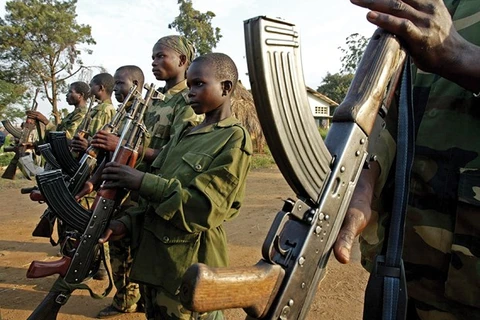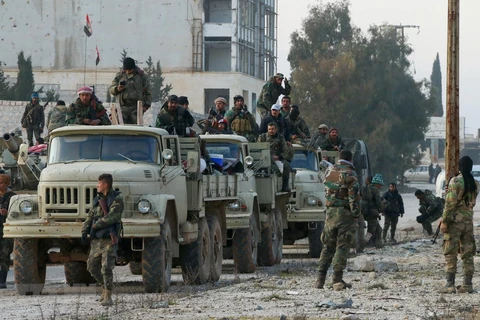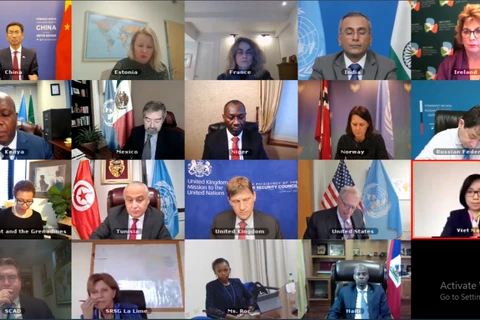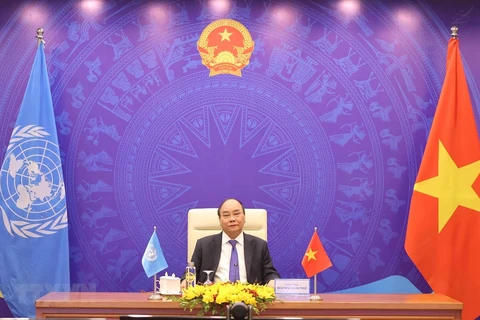Hanoi (VNA) - Prime Minister Nguyen Xuan Phuc attended and delivered remarks at an open debate of the UN Security Council (UNSC) on addressing climate-related risks to international peace and security, which was held in the form of video conferencing on February 23.
Following is the full text of the Prime Minister’s remarks.
Mr. President,
I applaud the initiative of the UK Government and yourself, Mr. President, to host this important UNSC open debate on “Addressing climate-related risks to international peace and security”. I would like to thank UN Secretary General António Guterres and Chair of the UN Youth Advisory Group Nisreen Elsaim for your insightful and substantive information and recommendations.
Mr. President,
Earth – our blue planet, and our shared home – is suffering from grievous impacts of climate change. 2020 was one of the three hottest years in modern history, and was faced with the constant and severe aftermaths of floods, droughts, bushfires, rising sea level, and the unprecedented COVID-19 outbreak.
Such calamities have placed great burdens on the political and socio-economic life of many countries. They have caused unemployment and poverty, affected the livelihood of hundreds of millions of people, and risked creating instabilities or exacerbating present conflicts in many countries and regions, thus threatening international peace and security. In addition, conflicts and instabilities would further erode countries’ resilience, and rob them of valuable resources that could have been utilised to overcome the challenges of climate change.
Therefore, I propose that the UNSC, with its foremost mission being the maintenance of international peace and security, needs to galvanize collective and persevering efforts of the international community via the following measures:
First, a comprehensive and balanced approach is necessary in handling the connections between traditional and non-traditional security challenges, particularly in addressing the root causes of conflicts, such as poverty, inequality, power politics and unilateral interference and coercion. Strict adherence to the UN Charter and international law must truly become a standard of behaviour for countries in international relations.
Second, for the 2030 Agenda for Sustainable Development (SDG-2030), the UN Framework Convention on Climate Change (UNFCCC), and the Paris Agreement (COP-21) to be effectively implemented, the UNSC and the international community should allocate greater resources to support developing countries, least developed countries, small island developing states, and land-locked countries that are most detrimentally affected by climate change, and are also lacking expertise and resources.
Third, I hope that the UNSC will continue to enhance its early warning capacity, and bolster its role in mediating, preventing and resolving conflicts in all regions, including through enhancing cooperation with regional organisations.
Fourth, in order to harmoniously manage the connection between climate change and security, it is necessary to continue upholding the principles of respect for the sovereignty, national ownership and principal responsibilities of states. The shared interests of communities and peoples, particularly vulnerable groups, must be placed at the heart of all national and global climate action strategies and plans.
Mr. President,
According to the World Bank, Vietnam is among the six countries most severely affected by climate change. Thus, active and effective response to climate change is both a major guideline and a strong political resolve by the Vietnamese Government. Vietnam has made great efforts to fulfil its international commitments on climate change (SDG-2030 and COP-21). In this connection, we support all endeavours to address climate-related challenges at the UNSC and other multilateral forums. I hope that the international community will provide Vietnam with further assistance and resources, so that we can better fulfil our commitments. Vietnam will work closely with other ASEAN members and support the cooperation between ASEAN and the UN.
Mr. President,
The world is burdened with the fight against COVID-19. Responding to the appeal of the UN Secretary General in “Making peace with nature is the defining task of the 21st century”, we should take bold actions and enhance international unity. I am confident that the “challenges” stemming from climate change can be transformed into “drivers” for change, contributing to fostering a future of peace and more sustainable development for next generations.
Thank you./.
Following is the full text of the Prime Minister’s remarks.
Mr. President,
I applaud the initiative of the UK Government and yourself, Mr. President, to host this important UNSC open debate on “Addressing climate-related risks to international peace and security”. I would like to thank UN Secretary General António Guterres and Chair of the UN Youth Advisory Group Nisreen Elsaim for your insightful and substantive information and recommendations.
Mr. President,
Earth – our blue planet, and our shared home – is suffering from grievous impacts of climate change. 2020 was one of the three hottest years in modern history, and was faced with the constant and severe aftermaths of floods, droughts, bushfires, rising sea level, and the unprecedented COVID-19 outbreak.
Such calamities have placed great burdens on the political and socio-economic life of many countries. They have caused unemployment and poverty, affected the livelihood of hundreds of millions of people, and risked creating instabilities or exacerbating present conflicts in many countries and regions, thus threatening international peace and security. In addition, conflicts and instabilities would further erode countries’ resilience, and rob them of valuable resources that could have been utilised to overcome the challenges of climate change.
Therefore, I propose that the UNSC, with its foremost mission being the maintenance of international peace and security, needs to galvanize collective and persevering efforts of the international community via the following measures:
First, a comprehensive and balanced approach is necessary in handling the connections between traditional and non-traditional security challenges, particularly in addressing the root causes of conflicts, such as poverty, inequality, power politics and unilateral interference and coercion. Strict adherence to the UN Charter and international law must truly become a standard of behaviour for countries in international relations.
Second, for the 2030 Agenda for Sustainable Development (SDG-2030), the UN Framework Convention on Climate Change (UNFCCC), and the Paris Agreement (COP-21) to be effectively implemented, the UNSC and the international community should allocate greater resources to support developing countries, least developed countries, small island developing states, and land-locked countries that are most detrimentally affected by climate change, and are also lacking expertise and resources.
Third, I hope that the UNSC will continue to enhance its early warning capacity, and bolster its role in mediating, preventing and resolving conflicts in all regions, including through enhancing cooperation with regional organisations.
Fourth, in order to harmoniously manage the connection between climate change and security, it is necessary to continue upholding the principles of respect for the sovereignty, national ownership and principal responsibilities of states. The shared interests of communities and peoples, particularly vulnerable groups, must be placed at the heart of all national and global climate action strategies and plans.
Mr. President,
According to the World Bank, Vietnam is among the six countries most severely affected by climate change. Thus, active and effective response to climate change is both a major guideline and a strong political resolve by the Vietnamese Government. Vietnam has made great efforts to fulfil its international commitments on climate change (SDG-2030 and COP-21). In this connection, we support all endeavours to address climate-related challenges at the UNSC and other multilateral forums. I hope that the international community will provide Vietnam with further assistance and resources, so that we can better fulfil our commitments. Vietnam will work closely with other ASEAN members and support the cooperation between ASEAN and the UN.
Mr. President,
The world is burdened with the fight against COVID-19. Responding to the appeal of the UN Secretary General in “Making peace with nature is the defining task of the 21st century”, we should take bold actions and enhance international unity. I am confident that the “challenges” stemming from climate change can be transformed into “drivers” for change, contributing to fostering a future of peace and more sustainable development for next generations.
Thank you./.
VNA
























